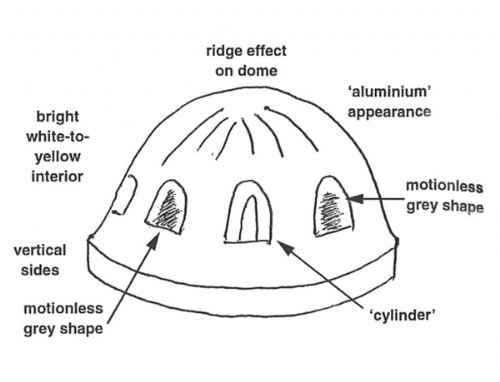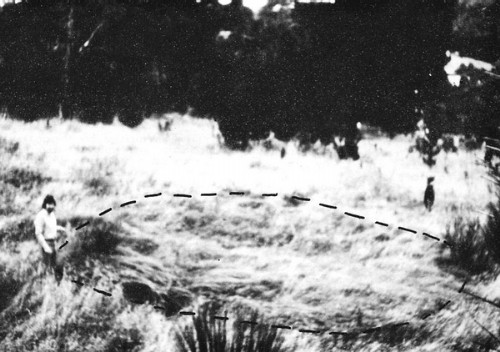Date:
February 1976
Location: Kettering, Australia
A
39 year-old man in Little Oyster Cove encountered an extraordinary
dome-shaped object which had landed. Through the windows
of the metallic object, he saw a tall cylindrical object
(which he likened to a ship's compass mounting) and 'motionless
grey shapes' (like car seats with headrests seen from
the rear), perhaps entities. The object rose slowly from
the ground, then increased speed and was gone. The next
morning, a circular patch of scorched grass was found
at the site.

Kettering UFO, based on sketch by witness. (credit: Bill
Chalker)

Photograph, taken one year after the sighting, showing
region of stimulated grass growth
that replaced grasses that were killed by the presence
of the UFO. In the original color
transparency the affected area stands out as a rich green
region in straw-colored
background. (credit: Flying Saucer Review)
Source:
Bill Chalker (1996)
THE
KETTERING LANDING
In
February 1976, in Kettering, Tasmania, a 39 year-old man
was woken up by his young child crying. He then noticed
what appeared to be a plane coming down from the eastern
sky on the shore of Little Oyster Cove. A widespread glow
emanated from the area. Thinking it could have been a
plane accident, the man hurried towards the light, still
in a dressing gown. From a small rise, he had an unobstructed
view, some 25 metres down the slope, of an extraordinary
dome-shaped object. Windows around the object gave off
a bright light The exterior looked like aluminium, with
ribbing or ridging from the top. Below the windows, a
small ledge led into a base, with a short vertical side.
Through the three or four windows, the witness saw a tall
cylindrical object (which he likened to a ship's compass
mounting) and 'motionless grey shapes' (like car
seats with headrests seen from the rear), perhaps entities.
A
humming noise, like an electric motor turning over, could
be heard as he drew closer. Then the object rose from
the ground, with the noise increasing as it went. It gained
elevation slowly, then increased speed. The object became
a dot in the sky and was gone. The whole incident lasted
about seven minutes.
The
witness went back to the spot in the morning and found
that the rough grass appeared to be scorched in a circle
where the object had rested. This grass later died and
was subsequently replaced by a 'tougher cutting grass'.
When the Tasmanian UFO Investigation Centre visited the
site, the affected area stood out as much greener than
the surrounding area. Investigations revealed no significant
differences in the thermo-luminescent content of the soil
and mineral particles taken from within the affected area
and from outside. The results indicated no large doses
of ionising radiation. The thermo-luminescence technique
allowed the analyst, Dr. G. Stevens, to conclude:
1)
The death of the grasses was not caused by substantial
heating of the soil. The soil on the surface had not been
heated above about 170 degrees C and soil about 5 cm down
had not been heated above about 155 degrees C.
2)
The death of the grass and subsequent stimulated re-growth
was not caused by large doses of ionising radiation.
Source:
http://www.ufoevidence.org/cases/case630.htm
